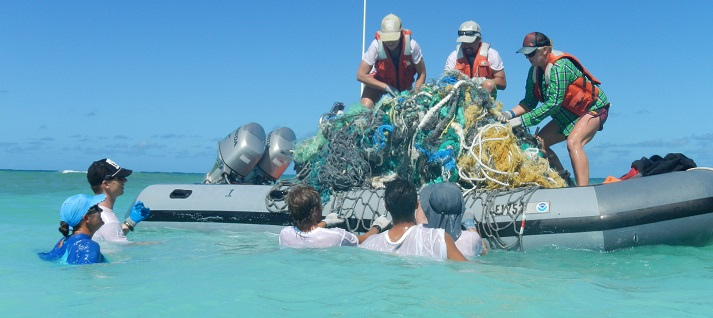Off the coast of California floats a Texas-sized island made out of garbage. It’s comprised almost entirely of humanity’s plastic waste. Where did this garbage mass in the middle of the Pacific Ocean came from? Plastic dumping. Plastic dumping is the practice of simply throwing away waste into rivers or lakes which eventually lead out into the ocean. Why isn’t this plastic being recycled? Why does this island of garbage continue to grow despite laws that prevent plastic dumping? The answer becomes very complicated when you look deeper at the history of the global recycling industry. To fix the growing pollution crisis, I suggest a free market approach.
China has historically imported most of the world’s recyclable material. They would clean, shred, or melt it, and make it into new goods. However, due to the popularity of single stream recycling (putting all recyclable materials into one bin), recyclables have become increasingly contaminated. Contamination has become so pervasive that China established a ban on contaminated recyclables called the “National Sword” policy which took effect on January 1, 2018. They no longer accept any shipments that are more than 0.5% contaminated. This means, for example, that the recycled peanut butter jar that wasn’t completely cleaned out would no longer be accepted by China. Since it was put in place, Chinese plastic imports have fallen by 99%.
With this ban, China hurt one of their own industries. The companies in China that used to receive these shipments of recyclable materials are no longer able to conduct business there. So companies have been buying facilities in the United States in order to clean and pelletize the waste before sending it to China. Song Lin, the head of one of these companies called UPT Group Inc., claims that there is a raw material shortage in China and that China will buy every pound of recycled plastic that they make.
Despite this shortage, China created this ban because it has a growing waste problem of its own, even without importing other countries’ waste. With China’s recent industrial boom, they have been overwhelmed by tons and tons of waste (literally)—byproducts of manufacturing. To combat this, the Chinese government recently announced plans to build 100 new recycling centers to deal with the massive pileup of garbage. In the meantime, however, the United States is also being flooded with waste: the waste that used to be shipped to China.
Much of the recyclable material that we used to export is sitting in the form of massive bales in warehouses, put in landfills, or even incinerated. Before China’s ban, only 9% of United States waste plastic was even recycled. 12% was burned. The rest was buried or thrown into rivers, lakes or the ocean. After the ban, America only recycled a miniscule 4.4% of waste plastic. This means that an incredibly low percentage of the stuff we throw into the recycling bin is even getting recycled.
In the United States, it’s illegal for companies to throw waste into bodies of water because of the Marine Protection, Research and Sanctuaries Act (MPRSA), so they are forced to bury it in landfills, which are subject to a lot of regulations. China has similar laws, but they are not strictly enforced. As a result, a lot of the unusable plastic that they import for recycling is dumped into bodies of water, because it’s much cheaper than burying or burning it. In fact, China, Indonesia, the Philippines, Thailand, and Vietnam dump more plastic into the oceans than all other countries in the world combined. China itself accounts for one-third of all the plastic in the oceans. Yes, the plastic water bottle that killed that blue whale wasn’t from your trash can (which would’ve sent it to a landfill), it’s from your recycling bin.
This isn’t a widely known fact. If people found out how economically inefficient recycling was, I would imagine that people would have a serious problem with sending our waste to China. Of course, nobody who recycles wants to see their plastic dumped into the ocean, so alternatives need to be explored. Putting it into a landfill is, contrary to popular opinion, a better and cleaner option, but it is still not the best one.
For once it may be a good thing that China put a ban on U.S. goods because it has forced us to wake up to this great environmental transgression that is being committed by the very people we expected to recycle our goods. But what do we do with all the waste that is piling up here in America? The best option may be to employ a free market approach.
Recyclable material, despite being considered waste, is a useful resource that can be used to create new products and wealth: it just needs to be utilized effectively. American businesses should build recycling plants which clean and pelletize waste plastic, paper, and metal in order to be shipped to China—or wherever else in the world—in order to be turned into products.
While it was probably cheaper to just ship the garbage to China, conducting the process here not only creates American jobs, it helps the environment by keeping more waste out of China’s grasp. If American businesses are able to innovate and cheaply turn waste into usable raw plastic, they will have a virtually endless supply of waste plastic to use and will have a virtually endless buyer in China. Free enterprise provides a tremendous opportunity to keep our environment clean.
As a Christian, I’m led to believe environmental stewardship is a fundamental teaching of scripture. The creation (or cultural) mandate, where God commands Adam to take care of creation, is found right at the beginning of the Bible in Genesis. God says to Adam in Genesis 1:28, “Be fruitful and multiply and fill the earth and subdue it.” The definition of the word “subdue” can be debated, but all Christians should agree that the environment should be cared for.
Instead of these huge piles of resources sitting in warehouses or being put in landfills, American businesses should take advantage of this cheap good and utilize it, making the environment cleaner in the process. In light of China’s ban, markets can help solve the growing waste problem.
Featured Image: Free-images.com Public Domain

